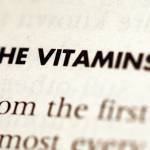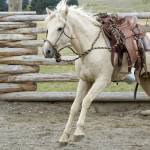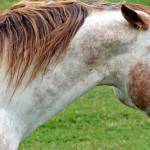Vitamin E for Horses: Choose Direct Supplementation

Vitamin E is an essential nutrient that must be consumed in the diet by horses. Horses naturally consume vitamin E when grazing good-quality, fresh green pasture, but vitamin E degrades quickly during harvesting, drying, and storage of forage for hay. Horses fed predominantly preserved forages (hay, hay cubes, hay pellets) require supplemental vitamin E.
The foremost biological role of vitamin E is that of an antioxidant. As such, vitamin E protects cells from damage by free radicals. Free radicals are generated from normal biological metabolism as well as from environmental contaminants. If free radicals start to overwhelm the ability of antioxidants to regulate them, changes in lipids, proteins, and even DNA can contribute to illness and disease, also known as oxidative stress. Vitamin E incorporates into the fatty membrane around cells where it can stabilize free radicals and prevent or reduce the damage they cause. Vitamin E and other antioxidants are critical to optimal health and performance.
Fat is added to rations for several reasons. Because it is high in calories, fat can help fuel weight gain and does so without causing a rise in glucose or insulin. Fat is metabolized relatively slowly, so it provides a measured, steady release of energy that supports endurance activities.
Moreover, research has uncovered the benefits of specific fatty acids. Both omega-3 and omega-6 fatty acids have important biologic roles in the body. Overconsumption of omega-6 fatty acids is common in domestic rations composed predominantly of hay and grains, and high-quality marine-derived omega-3 supplements, such as EO-3, are often used to balance the ratio of omega-6-to-omega-3 fatty acids in the diet.
No matter the type or reason for fat supplementation, as fat consumption increases, so should the intake of vitamin E. The oxidation, or “burning,” of fat in the body produces free radicals that are neutralized by vitamin E.
For the same reasons that vitamin E has such valuable biological functions, it is also commonly used as an antioxidant in food stabilization. Antioxidants extend shelf life and prevent rancidity. However, vitamin E used as an antioxidant in this way likely will be “spent” and not available to the horse. Factors such as storage conditions, product processing method, and length of storage prior to use may also affect the amount of vitamin E that is added to, or remaining in, a given product as a stabilizing agent. It can be difficult to determine how much of it is used up and what may be left over for possible absorption.
To ensure that vitamin E is delivered to the horse in proper amounts, it is best to supplement a high-quality, bioavailable source of vitamin E at the time of feeding fat. By doing so, the amount of vitamin E consumed by the horse can be more precisely controlled.
Kathleen Crandell, Ph.D., a nutritionist for Kentucky Equine Research, said, “Vitamin E should be added to the diet based on the individual horse’s needs. An average horse that weighs 1,100 lb (500 kg) needs approximately 1,000 IU of vitamin E per day. When considering the addition of dietary fat and with increasing amounts of exercise, it may be necessary to supplement additional vitamin E, from 1,500-2,000 IU daily.”
Horses in very intense training or those predisposed to muscle disorders may require more vitamin E.
Nano-E, a product developed by Kentucky Equine Research, uses advanced nanotechnology to create a highly bioavailable source of vitamin E, supporting not only antioxidant function but also muscle and nerve health.
In summary, the primary function of vitamin E is as an antioxidant, which in turn supports cellular health in the body. Supplementation of vitamin E is recommended for horses consuming high-fat diets and for horses who do not have access to fresh, quality pasture.
Contact Kentucky Equine Research for guidance in determining the right amount of vitamin E for your horse’s individual needs.
Harris, P. 2017. Notes on feeding vitamin E to healthy horses. In: Proc. European Equine Health and Nutrition Congress, From Nutrition to Disease and Back. Antwerp, Belgium. pp. 58-67.
Lobo, V., A. Patil, A. Phatak, and N. Chandra. 2010. Free radicals, antioxidants and functional foods: Impact on human health. Pharmacognosy Review 4(8): 118-126.
National Research Council. 2007. Nutrient Requirements of Horses, 6th Edition. National Academies Press, Washington, D.C.
Quiles, J.L., M.C. Ramirez-Tortosa, S. Ibanez, J.A. Gonzalez, G.G. Duthie, J.R. Huertas, and J. Mataix. 1999. Vitamin E supplementation increased the stability and the in vivo antioxidant capacity of refined olive oil. Free Radical Research 31 Suppl:S129-135.
Yang, Y., and D.J. McClements. 2013. Vitamin E bioaccessibility: Influence of carrier oil type on digestion and release of emulsified alpha-tocopherol acetate. Food Chemistry 141(1):473-481.








